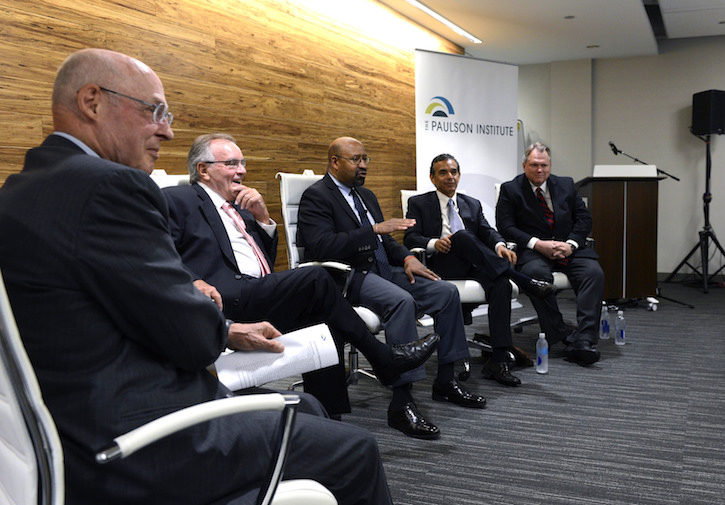
For a delegation of 18 top officials from Tianjin, a recent panel of four experienced U.S. mayors held the answers to unlocking China’s green city challenges. As part of the Paulson Institute’s Mayors Training Program, which brings Chinese mayors to the United States each year for intensive sustainability training, former mayors Antonio Villaraigosa (Los Angeles), Richard Daley (Chicago), Michael Nutter (Philadelphia), and Scott Smith (Mesa, AZ) joined a panel moderated by Institute Chairman Hank Paulson. China’s mayors and urban planners—who have “very tough” jobs, Paulson said—have been tasked with building some of the world’s largest cities while improving the environment and cutting carbon emissions. During the session, one Tianjin official asked the panel how Chinese cities could avoid the U.S. experience of “first polluting and then cleaning up.” Here’s how the U.S. mayors responded:
Antonio Villaraigosa (Los Angeles):
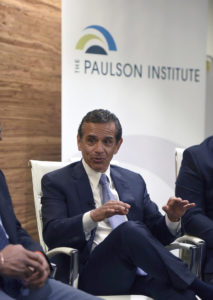 Incentivize businesses to invest in sustainable urban projects. When he took office in 2005, Antonio Villaraigosa, a Democrat who had been supported by labor unions, was perceived as anti-business. From day one, he realized that he needed the help of the business community to realize his vision for revitalizing Los Angeles’s downtown. After learning that new building projects required approval from 12 government departments, “we reduced it to one to ‘fast track’ development,” he said. He also traveled to China to encourage investment in L.A., turning its downtown into a top city for Chinese real estate investment in the U.S. Villaraigosa stressed the importance of engaging the business community to foster public-private partnerships, which China’s government is also promoting as a way to fund green development.
Incentivize businesses to invest in sustainable urban projects. When he took office in 2005, Antonio Villaraigosa, a Democrat who had been supported by labor unions, was perceived as anti-business. From day one, he realized that he needed the help of the business community to realize his vision for revitalizing Los Angeles’s downtown. After learning that new building projects required approval from 12 government departments, “we reduced it to one to ‘fast track’ development,” he said. He also traveled to China to encourage investment in L.A., turning its downtown into a top city for Chinese real estate investment in the U.S. Villaraigosa stressed the importance of engaging the business community to foster public-private partnerships, which China’s government is also promoting as a way to fund green development.
Richard Daley (Chicago):
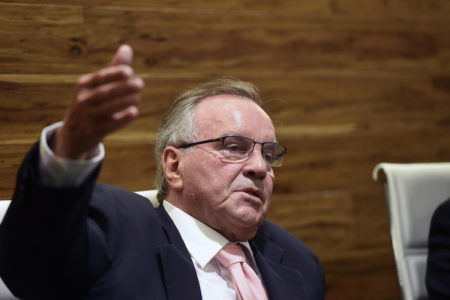 Start by focusing on one issue and tackle it in depth. “If I were you, I would go back to my city and pick one project that focuses on [improving] air, land, or water, and implement it as quickly as possible,” said Richard Daley, who was Chicago’s mayor from 1989-2011. “After a year,” he said, “go back and review how it went and learn from that.” Daley also spoke about his experience overseeing the creation of Millennium Park, which integrated art, culture, and conservation into the heart of Chicago—and has generated some $10 billion in revenue for the local economy. “When I started, the media criticized the project…but when it was completed, I became a hero.”
Start by focusing on one issue and tackle it in depth. “If I were you, I would go back to my city and pick one project that focuses on [improving] air, land, or water, and implement it as quickly as possible,” said Richard Daley, who was Chicago’s mayor from 1989-2011. “After a year,” he said, “go back and review how it went and learn from that.” Daley also spoke about his experience overseeing the creation of Millennium Park, which integrated art, culture, and conservation into the heart of Chicago—and has generated some $10 billion in revenue for the local economy. “When I started, the media criticized the project…but when it was completed, I became a hero.”
Michael Nutter (Philadelphia):
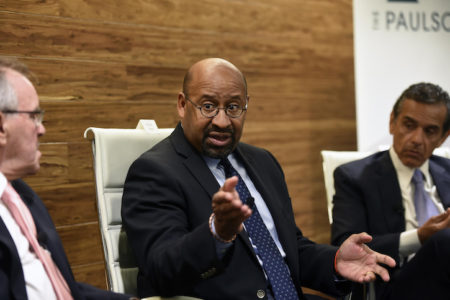 Encourage green buildings to save energy and money. As mayor of Philadelphia from 2008-2016, Michael Nutter required large buildings to measure and report energy usage, then worked with property owners to lower energy consumption. “We were able to show them that energy savings go right to their bottom line,” recalled Nutter. Increasing efficiency of buildings, which account for some 40 percent of the world’s carbon emissions, needs to be an important part of China’s urbanization drive if the country is going to achieve its climate targets. China is home to half of the world’s new construction, and so, with the right policies, is in a position to have a huge positive global impact. “These new energy efficient things are not fads, they are economically beneficial,” said Nutter.
Encourage green buildings to save energy and money. As mayor of Philadelphia from 2008-2016, Michael Nutter required large buildings to measure and report energy usage, then worked with property owners to lower energy consumption. “We were able to show them that energy savings go right to their bottom line,” recalled Nutter. Increasing efficiency of buildings, which account for some 40 percent of the world’s carbon emissions, needs to be an important part of China’s urbanization drive if the country is going to achieve its climate targets. China is home to half of the world’s new construction, and so, with the right policies, is in a position to have a huge positive global impact. “These new energy efficient things are not fads, they are economically beneficial,” said Nutter.
Scott Smith (Mesa, Arizona):
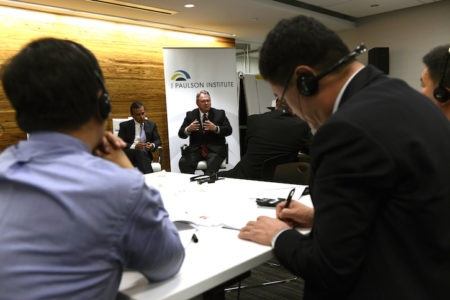
Talk about sustainability in terms of values. As mayor from 2008-2014 of Mesa, AZ, the “most conservative large city in the U.S.,” Scott Smith faced political opposition to his vision of sustainability. By framing his environmental ideas around values, he was able to implement the most aggressive recycling program in the state, as well as a robust solar energy effort. “Everybody wants to live in a clean, safe city, no matter what side they are on politically,” he said. Smith encouraged the Chinese local leaders to clearly outline their policies and effectively communicate them with their constituents.


